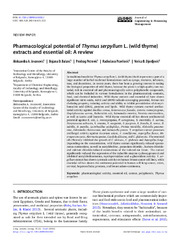Приказ основних података о документу
Pharmacological potential of Thymus serpyllum L. (wild thyme) extracts and essential oil: A review
| dc.creator | Jovanović, Aleksandra A. | |
| dc.creator | Balanč, Bojana D. | |
| dc.creator | Petrović, Predrag | |
| dc.creator | Pravilović, Radoslava | |
| dc.creator | Đorđević, Verica B. | |
| dc.date.accessioned | 2023-03-08T13:45:58Z | |
| dc.date.available | 2023-03-08T13:45:58Z | |
| dc.date.issued | 2021 | |
| dc.identifier.issn | 1840-4774 | |
| dc.identifier.uri | http://TechnoRep.tmf.bg.ac.rs/handle/123456789/5997 | |
| dc.description.abstract | In traditional medicine Thymus serpyllum L. (wild thyme) herb represents a part of a large number of herbal medicinal formulations such as syrups, tinctures, infusions, teas, and decoctions. In recent years, there has been a growing interest in testing the biological properties of wild thyme, because the plant is a high-quality raw material, rich in essential oil and pharmacologically active polyphenolic compounds, which can be included in various formulations in the pharmaceutical, cosmetic, food, and chemical industries. Wild thyme extracts and essential oil have shown significant nitric oxide, ABTS and DPPH radicals scavenging potential, ferrous ion chelating property, reducing activity and ability to inhibit peroxidation of deoxyribonucleic acid (DNA), proteins and lipids. Wild thyme extracts exerted antibacterial activity against Bacillus cereus, Enterococcus faecalis, Listeria monocytogenes, Staphylococcus aureus, Escherichia coli, Salmonella enterica, Yersinia enterocolitica, as well as Lactic acid bacteria. Wild thyme essential oil has shown antibacterial potential against E. coli, L. monocytogenes, P. aeruginosa, S. enteritidis, S. aureus, Streptococcus salivariu, S. mutans, S. sanguinis, S. pyogenes, E. feacalis, B. cereus, B. subtilis, B. pumilis, Lactobacillus acidophilus, Proteus mirabilis, Klebsiella pneumoniae, Salmonella choleraesuis, and Salmonella poona. T. serpyllum extract possesses antifungal activity against Fusarium solani, F. moniliforme, Aspergillus flavus, Microsporum canis, Alternaria species, Candida albicans, and C. glabarata. The essential oil efficiently inhibited the growth of C. albicans, C. glabrata and Aspergillus fungi. Depending on the concentration, wild thyme extract significantly relaxed spontaneous contractions, as well as acetylcholine-, potassium chloride-, barium chlorideand calcium chloride-induced contractions of the isolated rat ileum. The extract significantly reduced the expression of the inducible enzyme cyclooxygenase-2 and inhibited acetylcholinesterase, myeloperoxidase and α-glucosidase activity. T. serpyllum extract has shown cytotoxic activity on human breast cancer cell lines, while essential oil has shown the antitumor potential in human cell lung cancer, colon, cervical, hepatocellular, prostate, and breast adeno-carcinoma. | sr |
| dc.language.iso | en | sr |
| dc.publisher | University of East Sarajevo, Faculty of Technology | sr |
| dc.relation | info:eu-repo/grantAgreement/MESTD/inst-2020/200287/RS// | sr |
| dc.relation | info:eu-repo/grantAgreement/MESTD/inst-2020/200135/RS// | sr |
| dc.relation | info:eu-repo/grantAgreement/MESTD/inst-2020/200003/RS// | sr |
| dc.rights | openAccess | sr |
| dc.rights.uri | https://creativecommons.org/licenses/by-nc-nd/4.0/ | |
| dc.source | Journal of Engineering & Processing Management | sr |
| dc.subject | pharmacological activity | sr |
| dc.subject | essential oil | sr |
| dc.subject | extract | sr |
| dc.subject | polyphenols | sr |
| dc.subject | Thymus serpyllum | sr |
| dc.title | Pharmacological potential of Thymus serpyllum L. (wild thyme) extracts and essential oil: A review | sr |
| dc.type | article | sr |
| dc.rights.license | BY-NC-ND | sr |
| dc.citation.epage | 41 | |
| dc.citation.issue | 2 | |
| dc.citation.spage | 32 | |
| dc.citation.volume | 13 | |
| dc.identifier.doi | 10.7251/JEPM2102032J | |
| dc.identifier.fulltext | http://TechnoRep.tmf.bg.ac.rs/bitstream/id/15952/Pharmacological_potential_pub_2021.pdf | |
| dc.type.version | publishedVersion | sr |

